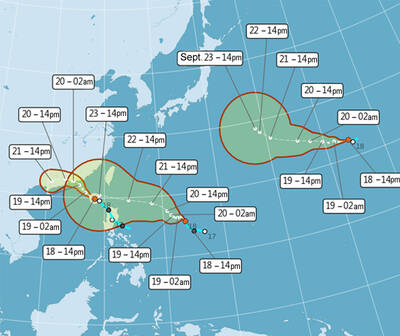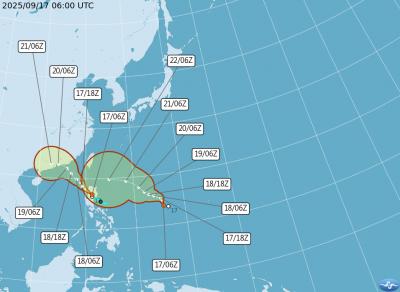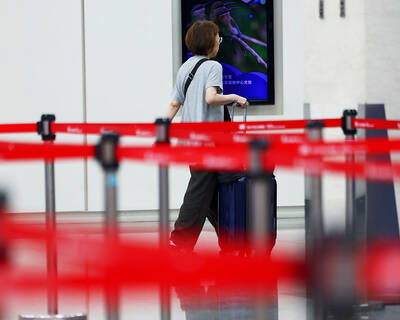The Democratic Progressive Party (DPP) and Taiwan Solidarity Union (TSU) yesterday said they would cosponsor a conference next month on consolidating public opinion on national affairs.
The two parties yesterday held a preparatory meeting for the 2009 Taiwan Civil National Affairs Conference to be held on Feb. 21 and Feb. 22.
DPP Chairperson Tsai Ing-wen (蔡英文) told a press conference that since President Ma Ying-jeou (馬英九) took office in May, his government had carried out many policies that were eroding the nation’s sovereignty, economy, democracy and human rights.
Taiwan faces its most serious challenges in decades, Tsai said, but the Chinese Nationalist Party (KMT) with its authoritarian past refuses to listen to public opinion.
Tsai said the two parties would use the conference to give the public a chance to voice their opinions.
The conference could help monitor the government by highlighting public concerns, she said. Central government officials will also be invited.
TSU Chairman Huang Kun-huei (黃昆輝) said the KMT government had done only two things since returning to power — seeking a return to the authoritarian system of the 1970s and yielding to China on cross-strait issues.
Academia Sinica research fellow Chiu Hei-yuan (瞿海源), one of the program committee members for the conference, said he expected to attend the conference with a heavy heart.
The KMT’s “new party-state system” had jeopardized society, the economy and democracy, Chiu said, adding that democratic politics was party politics and that the conference aims to use the power of opposition parties to impose checks and balances on the ruling party.
Yesterday’s meeting reached an agreement that the conference would seek to propose a basic direction for Taiwan’s society and offer a blueprint for the next five to 10 years in the nation’s development.
The conference would put pressure on the government by airing the public’s wishes — in particular by prioritizing policies that would help disadvantaged groups, the parties said.
The DPP and TSU will invite researchers and academics from think tanks and universities, lawmakers and representatives of political parties, as well as experts in various fields.
The program committee members include Chiu, Soochow University political science professor Hawang Shiow-duan (黃秀端), former national policy adviser Huang Tien-lin (黃天麟), Friends of Lee Teng-hui Association president Hwang Kun-hu (黃崑虎), former Taiwan Stock Exchange chairman Wu Rong-i (吳榮義), Taiwan Society chairman Wu Shuh-min (吳樹民), Taiwan Thinktank chairman Chen Po-chih (陳博志), Taiwan New Century Foundation chairman Chen Lung-chu (陳隆志) and others.

PEAK MONTHS: Data showed that on average 25 to 27 typhoons formed in the Pacific and South China seas annually, with about four forming per month in July and October One of three tropical depressions in the Pacific strengthened into a typhoon yesterday afternoon, while two others are expected to become typhoons by today, Central Weather Administration (CWA) forecaster Lee Ming-hsiang (李名翔) said yesterday. The outer circulation of Tropical Depression No. 20, now Typhoon Mitag, has brought light rain to Hualien, Taitung and areas in the south, Lee said, adding that as of 2pm yesterday, Mitag was moving west-northwest at 16kph, but is not expected to directly affect Taiwan. It was possible that Tropical Depression No. 21 would become a typhoon as soon as last night, he said. It was moving in a

A Taiwanese academic yesterday said that Chinese Ambassador to Denmark Wang Xuefeng (王雪峰) disrespected Denmark and Japan when he earlier this year allegedly asked Japan’s embassy to make Taiwan’s representatives leave an event in Copenhagen. The Danish-language Berlingske on Sunday reported the incident in an article with the headline “The emperor’s birthday ended in drama in Copenhagen: More conflict may be on the way between Denmark and China.” It said that on Feb. 26, the Japanese embassy in Denmark held an event for Japanese Emperor Naruhito’s birthday, with about 200 guests in attendance, including representatives from Taiwan. After addressing the Japanese hosts, Wang

One of two tropical depressions that formed offshore this morning could turn into a moderate typhoon by the weekend, the Central Weather Administration (CWA) said today. Tropical Depression No. 21 formed at 8am about 1,850km off the southeast coast, CWA forecaster Lee Meng-hsuan (李孟軒) said. It is expected to move in a northwesterly direction as it continues building momentum, possibly intensifying into Typhoon Mitag this weekend, she added. The radius of the storm is expected to reach almost 200km, she said. It is expected to approach southeast of Taiwan on Monday and pass through the Bashi Channel between Tuesday and Wednesday,

About nine Taiwanese are “disappeared,” detained, or otherwise deprived of freedom of movement in China each month, the Mainland Affairs Council (MAC) said yesterday. Between Jan. 1 last year and Aug. 31 this year, 188 Taiwanese travelers went missing, were detained and interrogated, or had their personal freedom restricted, with some questioned in airports or hotel lobbies, the council said. In a statement ahead of the Mid-Autumn Festival, the council urged people visiting China for any reason to be highly vigilant and aware of the risks. Of the reported cases, 50 people were “disappeared” after entering China, 19 were detained and 119 had